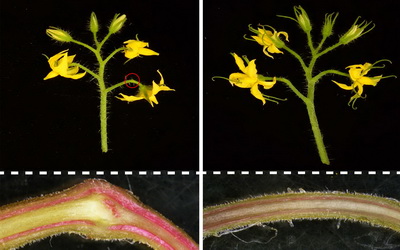
Study Shows How Nature Makes Solution to Hidden Mutations
May 8, 2019| |
 Genetics professor Zachary Lippman, together with team, shared the result of their study on cryptic mutation and some vital lessons for gene editing in crops. Their study is published in Nature Plants.
Genetics professor Zachary Lippman, together with team, shared the result of their study on cryptic mutation and some vital lessons for gene editing in crops. Their study is published in Nature Plants.
The research is founded in the story of Campbell Soup Company and a field of tomatoes back in the mid-20th century. In the field of tomatoes, one plant had a surprising characteristic-the fruits separated from the vine right where the green cap and step touch the rest of the fruit. This jointless mutant plant was ideal for large-scale production because the other varieties would break away at a joint-like nub in the fruit stem, leaving pointed green caps that puncture other tomatoes in transit. The breeders called the gene mutation as jointless-2 (j2) and tried to introduce it into many varieties. However, doing so led to jointless tomato plants with excessive branching.
In 2017, Lippman and colleagues revealed that an ancient gene mutation interferes with j2 leading to a cryptic mutation. Now with the advent of gene editing techniques such as CRISPR, scientists can make fine adjustments in the mutations to prevent negative interactions that hinder agricultural production. Lippman also found that some breeders were able to neutralize negative interactions by duplicating the ancient mutation that interacts with j2. In other words, doubling the ancient mutation gives the same result as having no mutation at all.
"This [duplication event] was naturally occurring, so basically, nature provided the solution to its own problem," Lippman stressed.
Read more from Cold Spring Harbor Laboratory.
| |
Biotech Updates is a weekly newsletter of ISAAA, a not-for-profit organization. It is distributed for free to over 22,000 subscribers worldwide to inform them about the key developments in biosciences, especially in biotechnology. Your support will help us in our mission to feed the world with knowledge. You can help by donating as little as $10.
-
See more articles:
-
News from Around the World
- Global Team Sequences 429 Chickpea Lines from 45 Countries to Develop High-Yielding, Climate Resilient Crop
- Genome Analysis of African Yam Backs Niger River as Cradle of African Agriculture
- Scientists Release Most Accurate Peanut Genome Sequence to Date
- Researchers Identify Cause of Seed Abortion and Role of RNA Pol IV Enzyme in Seed Development
- New Gene Metrics Increase Precision of Plant Breeding Technology
- Climate Extremes Explain 18%-43% of Global Crop Yield Variations
- Genomes of 480 Wheat Varieties Reveal Evolution, Human Sociocultural History
- Study Reveals Climate Change Boosts Banana Disease
- Healthful Oils from GM Plant as Effective as Fish Oil
-
Research Highlights
- Experts Characterize Cadmium-responsive MiRNAs and their Target Genes in Maize
-
Announcements
- ASEAN-U.S. Science Prize for Women
-
Resources
- Interactive Map Shows Crop Field Trial Sites in Australia
-
Plant
- Study Shows How Nature Makes Solution to Hidden Mutations
- CRISPR-Cas9 Used to Recover Red Pigmentation in Elite Rice Varieties
-
Read the latest: - Biotech Updates (February 11, 2026)
- Gene Editing Supplement (January 28, 2026)
- Gene Drive Supplement (February 22, 2023)
-
Subscribe to BU: - Share
- Tweet
